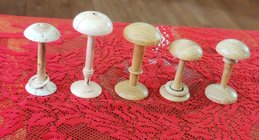@Donna - would you mind sharing what takes up most of your time concerning selling your work? I’m a big admirer of your work and appreciate your responses!
Marketing: taking images, both in process and completed studio quality. Posting on social media. Making a conscious decision to do that regularly, if not every day, then at least several times a week. Responding to inquiries about your work, prices, do you ship, what credit cards you take, and – key- determining whether the inquiry is legitimate, or a scam. Some are getting harder to make that calculation, until you’ve wasted time responding and the usual give/take.
Applying for shows: Completing applications that require top quality images of the work that you intend to sell in that venue. Most high-end shows jury your entry based on the images of work that you intend to sell. And if you have work in your booth that was not included in your juried images, you will be told to pull that work. All high-end shows want to see an image of your booth. Typically, 5 images of your work, and a booth image. Jurors will spend between 5-10 seconds looking at your images and decide on whether you are out, or whether you are acceptable to move to the next stage of jurying – essentially a culling process. You need to keep track of the show deadlines, and the deadlines in notifications. If you don’t get into one show, that opens up a chunk of your calendar that you want to fill. With another show application. And booths…that is an art in itself. The right display, the correct lighting and color of light, enough lighting, is it easy to set up/break down, and transport without needed to make major repairs/re-painting every time you have another show.
Workshops/club demonstrations/Symposiums: Some start with an inquiry from their end: what can you demonstrate/teach? You supply a list of topics, but they want more. Images, descriptions, skill level target, length of time needed for each topic (which is essential in workshops), and cost. If the discussion goes beyond that, a detailed list of what the participants will learn, key-points, list of equipment needed by attendees, what equipment you will supply, and cost of materials to participants. Regardless of the topic, you will spend time preparing for the demo/workshop/symposium before leaving home, as well as travel to and from which you might get reimbursed for travel expenses, but not the days you spent making pieces in progress (which happens all the time in what I do – nothing can be done in a couple of hours, so I have to make several pieces that show each step) or the travel time getting there and back.
Staying ahead of the curve: I have ideas for new work all the time. But they can’t become marketable work without several iterations of practice, learning the technique, practicing the pattern, finding out what works and doesn’t, trying to remember what worked before and what was a failure – and that is important when your sessions are interrupted by having to pack for a show, travel to the show, set up, sit there for 2-3-5-9 days, pack up and travel home, unpack, make work to replace what sold…Coming up with new work takes more than a few days of practice. The Covid isolation period was a silver lining for me. I had 18 months of my calendar wiped clean of workshops, shows and Symposia. I learned how to carve with a woodburning tip and to apply color using the dry-brush paint method, thanks to Laurent Niclot, who learned from Jacques Vesery. You can learn a new skill in a few weeks, but to really do it well takes a lot of time – uninterrupted time. So, my Wood Ffolkkes sculptures were the result of over a years’ work in the studio, uninterrupted. I have nearly a hundred sample pieces, boards, half carved, multiple painted surfaces that were all not quite successful. Until I got to the point that I was satisfied.
Phew, if you aren’t exhausted just reading about all this work, then you might take that next step…

